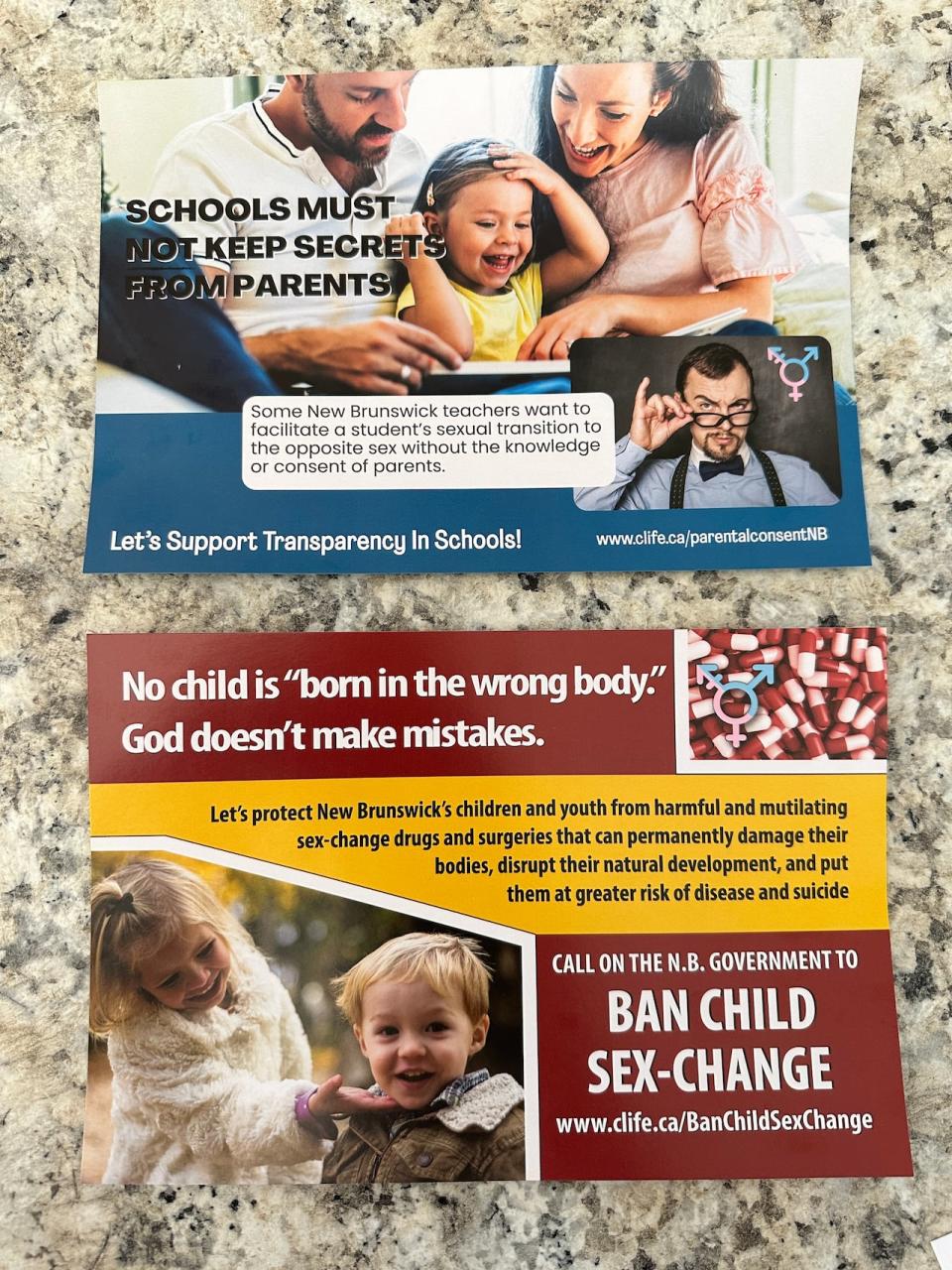


A Canada Post worker says she was suspended after refusing to deliver flyers that compare gender-affirming medical care to child mutilation.
The flyer from Campaign Life Coalition, an anti-abortion group based in Hamilton, Ont., calls for a ban on “child sex-change.”
Shannon Aitchison said she is the mother of a transgender adult and given that gender-affirming surgery is only available to people aged 18 and above, believes the wording of the flyers is harmful and discriminatory against transgender people.
“It’s misinformation. It is lies and misinformation being presented as truth,” she said.
This is the third flyer sent by the group since August. The first two were in support of the Blaine Higgs government’s changes to Policy 713, requiring parental consent before school staff can use a child under the age of 16’s chosen name and pronouns.
Higgs’s campaign manager, Steve Outhouse, has previously said the Progressive Conservatives have “no involvement with this flyer or the actions” of the group.
The most recent flyer calls for banning gender-affirming health care for youth.
WATCH | Why Canada Post doesn’t consider these flyers ‘non-mailable’:
Gender-affirming surgeries are available for those over 18 years of age in New Brunswick.
Gender-affirming treatment can be given earlier with parental permission. Medical professionals may grant exceptions for older teens who are deemed mature enough to make the decision.
The flyer says, “No child is ‘born in the wrong body. God doesn’t make mistakes.”
Aitchison said she’s delivered mail in the past that she personally didn’t agree with, but the flyer goes a step further.
“This is the first time I have ever drawn a line in the sand and said … I will not be party to delivering propaganda,” she said.

Campaign Life Coalition flyers began showing up in people’s mailboxes ahead of the fall election call. (Isabelle Legere/CBC)
A lawyer for Campaign Life Coalition sent a letter to Canada Post in late August, stating that any limitation of the group’s flyers would be an infringement of its freedom of expression guaranteed under the Charter.
“The flyers … do not bear any illegal or prohibited messages, characteristics or markings. They do not contain sexually explicit material. The flyers contain no graphic images, obscenity, or hateful expression,” the letter said. “The flyers merely make a comment on a policy enacted in the Province of New Brunswick. As such, they constitute political expression which lies at the core of the constitutional guarantee of free expression.”
Campaign Life Coalition has registered as a third-party advertiser in the provincial election that’s now underway.
Union grievance
When the first of these flyers showed up in New Brunswick mailboxes last month, the Canadian Union of Postal Workers said its workers “have been given the option of not delivering the offensive material if it would cause them mental anguish or if they fear for their health and safety.”
Aitchison said these flyers meet that criteria for her.
“It puts my safety at risk because people are going to take their anger, frustration, whatever out on me,” she said.
It’s not clear whether the option was given by the union or Canada Post, and why Aitchison was suspended despite what the union said. The union has not yet responded to CBC questions on the issue.
After three days of suspension, Aitchison said she had a disciplinary meeting and is still awaiting a decision. She said the union has filed a grievance on her behalf.
Canada Post says flyers don’t count as ‘non-mailable matter’
Gender identity and expression are protected under both the federal and provincial Human Rights Act.
Canada Post did not respond to questions about how many workers were suspended or the circumstances of any flyer-related suspensions.
In an emailed statement, a spokesperson said the flyer “does not meet the definition of non-mailable matter.”
Non-mailable matter includes material that is illegal, obscene or sexually explicit.
Moncton resident Cassandra Taylor said she filed a complaint with Canada Post. The response she got said the flyers don’t count as hate mail, Taylor said, and she disagrees.
“I don’t want to see this in my mailbox, distributed by a federal agency. That’s wrong.”
Constitutional expert Kerri Froc said courts are undecided on whether the Charter of Rights and Freedoms applies to Canada Post, because it’s a Crown corporation and not government.


Constitutional expert Kerri Froc says it’s not clear whether the Charter of Rights and Freedoms applies to what Canada Post delivers and its employment policies. (Submitted by Kerri Froc)
Froc said hate speech under the Criminal Code is a high bar to meet.
“It has to be pretty extreme. It’s what the Supreme Court calls a detestation or vilification, basically that a certain group of people don’t have the right to exist, that they have no redeeming qualities,” Froc said.
She said the Canada Human Rights legislation has a slightly lower bar, where there’s a provision against publishing anything discriminatory. But she said it’s still difficult to prove.
“It has to rise above merely being offended or upset by something. You have to actually feel like this is something that causes trans people to fear that their basic humanity is being threatened,” she said. “I don’t think it meets that threshold.”
Aitchison said she was lucky that she has a supportive household, where she’s able to take a stand and risk her livelihood, but not everyone can.
“I believe that I’ve done the right thing. I can sleep at night,” she said. “People have to stand up for something or you’ll fall for anything.”